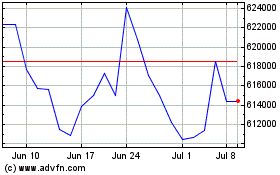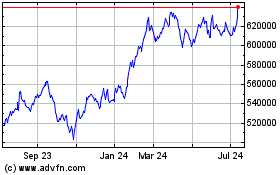Calpers Eyes Direct Investments in Private Equity -- Update
May 17 2018 - 6:12PM
Dow Jones News
By Dawn Lim
The nation's largest pension is considering a new strategy:
setting up multibillion-dollar funds to buy and hold private
companies for the long haul, replicating the approach of Warren
Buffett's Berkshire Hathaway Inc.
California Public Employees' Retirement System wants to be the
sole backer of funding vehicles that will invest in technology
startups or privately held businesses. The move would help Calpers
cut its reliance on traditional Wall Street funds and slash hefty
fees paid to those firms.
The plan, which needs to be approved by Calpers board, could
give the pension fund as much as $20 billion in new venture-capital
stakes and positions in unlisted companies within a decade,
investment officials said.
The proposal is part of a push by the roughly $355 billion state
pension to boost returns and score access to coveted deals. Calpers
has held months of protracted internal discussions on the future of
its private-equity portfolio. The roughly $26 billion portfolio has
underperformed its benchmarks over the past decade.
Over the 10-year period ended March 31, Calpers said its return
of 8.9% from private equity was short of the benchmark, according
to pension fund documents. It has outperformed its benchmark over
the last 20 years.
Calpers's deliberations underscore a growing trend among U.S.
state funds, including the Teacher Retirement System of Texas and
the California State Teachers' Retirement System, to find new ways
to control how their money is invested. Calpers, which is
responsible for benefits to more than 1.9 million active or retired
public workers, doesn't have enough assets to meet the state's
promised obligations to retirees.
The proposed model would cost Calpers less than what most
private-equity firms charge investors, which is often up to a 2%
annual fee on assets managed and a 20% cut of profits.
Calpers, like many U.S. pensions, faces an increasingly crowded
field and diminishing bargaining power to set fees and terms as
sovereign-wealth funds and other investors jostle for slots in
popular private-equity funds. Calpers's planned venture would allow
it to create investment partnerships in which it is the only
investor.
"We're going to own them [companies] forever rather than being
forced to sell them at an arbitrary time point," said Chief
Investment Officer Ted Eliopoulos. Earlier this week, Mr.
Eliopoulos, a key architect who tried to simplify the portfolio and
cut fees, said he would step down by year-end.
As part of its proposal, Calpers is considering a platform
focused on late-stage startups in technology, life sciences and
health care, an area where heated competition is sending the prices
of deals skyrocketing. The plan would be a major shift for the
pension fund, which only had a sliver of its private-equity
portfolio -- some 3% -- in venture capital as of December.
In addition, Calpers is looking to launch a vehicle to buy and
hold companies with stable revenues.
The proposal would go into effect in 2019 if it gets board
approval. One board member, Margaret Brown, in a statement Thursday
expressed concerns that the board doesn't have full details.
Mr. Eliopoulos said discussions are in progress and "there's
more work and deliberation to come."
This week board members gave staff the approval to start
researching how it would implement the proposed model, a person
familiar with the fund said.
Calpers lacks a permanent head of private equity after Real
Desrochers stepped down about a year ago, but expects a new
private-equity chief to be announced in June, the person said.
Calpers expects that it would need to invest up to $13 billion a
year to meet its goal of having 10% of assets in private equity.
Any new initiatives would take place alongside more traditional
investments in private-equity funds. The fund only had 7.6% of
assets in the asset class at year's end, below its goal.
Write to Dawn Lim at dawn.lim@wsj.com
(END) Dow Jones Newswires
May 17, 2018 17:57 ET (21:57 GMT)
Copyright (c) 2018 Dow Jones & Company, Inc.
Berkshire Hathaway (NYSE:BRK.A)
Historical Stock Chart
From Mar 2024 to Apr 2024

Berkshire Hathaway (NYSE:BRK.A)
Historical Stock Chart
From Apr 2023 to Apr 2024
